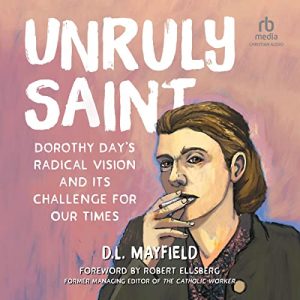 Summary: A biography of a radical Christian who took seriously the call to help the marginalized.
Summary: A biography of a radical Christian who took seriously the call to help the marginalized.
Dorothy Day is someone that I have known about for a long time, but someone who I have not known much about. I have read one of DL Mayfield’s previous books and I know that she takes seriously the call for Christians to serve and live with the marginalized so I thought she would be a good author to read about Dorothy Day. (I have also read a book by her husband, a counselor.)
Unruly Saint is not a lengthy biography, about 250 pages. And most of its focus is on the founding of the Catholic Worker and its early years. Mayfield’s personal reflections on Day and her use of the research on Day as a way to grapple with her own Christian faith I think is one of the strengths of the books, but also one that may not appeal to everyone. I particularly read a lot of biography and memoir because I want to know how others have thought about what it means to live a good life or discern how to they can live in a complicated world. Reflective biographies like this give me insight not only into the subject of the biography but the author.
I was aware of the basic shape of Day. I knew she was a writer and that she founded the Catholic Worker Newspaper and various others activities to serve the poor during the Great Depression. I knew she was a radical and had been a communist prior to becoming Catholic. I knew that she had a child and was a pacifist. But I think that was really the extent of what I knew walking into this biography.
I am not going to rehash the book. But what I appreciate about Mayfield’s writing is that she is empathetic to both the strengths and weaknesses of Day and she doesn’t try to cover up either. At the end there is a grappling with the movement to officially recognize Day as a Catholic Saint. It is clear that Day wanted to try to live like a saint but didn’t want to be treated like one. There are several quotes about how Day was concerned about being minimized and reduced to “a saint” in a way that reduced the call to serve the marginalized to work that only saints did and not a calling on all Christians. Mayfield also reflects on the fact that Day was overwhelmed by her work often, but saw the need and couldn’t say no to giving away almost anything she had to someone who needed it because she understood the desperation of real need. Day assumed that others would react as she did when they also saw the need; but many do not.
There was a real community that formed around her, but it was also not a community that cared for Day as peers. She was lonely in part because she had such a strong call and skill at organizing. But I think she needed a community that would have shared responsibility and helped to get her to learn about her healthy, created limitations. There just do seem to be people with nearly superhuman capacity, but it isn’t unlimited capacity. There are people that I know who do so much more than I am physically capable of, but no one can operate without limitations.
More than anything else this made me want to know more about Dorothy Day. I already have a copy of The Reckless Way of Love by Dorothy Day, with an introduction by DL Mayfield and Dorothy Day: The World Will Be Saved By Beauty, the biography written by her granddaughter. Day’s autobiography, The Long Loneliness is on Kindle Unlimited, so I will borrow that eventually.
Unruly Saint: Dorothy Day’s Radical Vision and Its Challenge for Our Times by DL Mayfield Purchase Links: Hardcover, Kindle Edition, Audible.com Audiobook